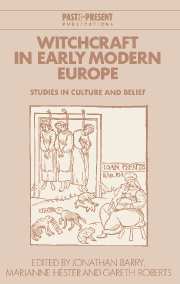Book contents
- Frontmatter
- Contents
- Preface
- Contributors
- 1 Introduction: Keith Thomas and the problem of witchcraft
- PART 1 THE CRIME AND ITS HISTORY
- PART 2 WITCHCRAFT AND RELIGION
- PART 3 THE MAKING OF A WITCH
- PART 4 WITCHCRAFT AND THE SOCIAL ENVIRONMENT
- PART 5 DECLINE
- 12 Witchcraft repealed
- 13 On the continuation of witchcraft
- Index
- Past and Present Publications
13 - On the continuation of witchcraft
Published online by Cambridge University Press: 06 July 2010
- Frontmatter
- Contents
- Preface
- Contributors
- 1 Introduction: Keith Thomas and the problem of witchcraft
- PART 1 THE CRIME AND ITS HISTORY
- PART 2 WITCHCRAFT AND RELIGION
- PART 3 THE MAKING OF A WITCH
- PART 4 WITCHCRAFT AND THE SOCIAL ENVIRONMENT
- PART 5 DECLINE
- 12 Witchcraft repealed
- 13 On the continuation of witchcraft
- Index
- Past and Present Publications
Summary
In this chapter, I will combine some general points of critique on Thomas' Religion and the Decline of Magic with specific refutations of his remarks on the ‘survival’ of traditional witchcraft into the twentieth century. While my overall criticism is mainly of a theoretical nature, the specific comments are illustrated with material taken from my research on Dutch witchcraft. Although a comparison of witchcraft in England with that in the Netherlands might yield some salient differences, here it is above all meant to provide further possibilities for the study of ‘witchcraft’ – that is, labelling people as ‘witches’ – in historical European contexts. Among other things, I will argue that, at least in some situations, the opposition of ‘magic’ and religion prohibits the recognition of the latter as a legitimising category that also encapsulated witchcraft.
When commenting upon a book more than twenty years old, as Religion and the Decline of Magic is, one has to take into account that it has already been criticised and that its author will have had the time to reconsider some of his hypotheses and conclusions. However, that should not deter one from criticism, especially when the book is still referred to (the Dutch translation was published only a few years ago) and even constitutes the starting point for most students of early modern witchcraft. Also, I think it is possible to uncover some problems that have, at least partly, escaped attention so far.
- Type
- Chapter
- Information
- Witchcraft in Early Modern EuropeStudies in Culture and Belief, pp. 335 - 352Publisher: Cambridge University PressPrint publication year: 1996
- 2
- Cited by

